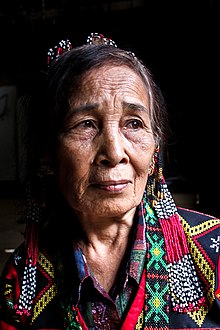
Back Katutubong T'boli BCL Pueblo tboli Spanish Tboli herria Basque T'bolis French T'boli ID Tboli Latvian/Lettish T'boli (volk) Dutch T'boli Tagalog
 An elderly Tboli woman in Tboli attire. | |
| Total population | |
|---|---|
| 181,125 (2020 census)[1] | |
| Regions with significant populations | |
| Languages | |
| Tboli, Cebuano, Hiligaynon, Filipino | |
| Religion | |
| Christianity Islam Tboli polytheism | |
| Related ethnic groups | |
| Austronesian peoples, Lumad, and Sama-Bajau peoples |


The Tboli people[2] (IPA: ['tʔbɔli]) are an Austronesian ethnic group native to South Cotabato in southern Mindanao in the Philippines.
Tbolis currently reside on the mountain slopes on either side of the upper Alah Valley and the coastal area of Maitum, Maasim and Kiamba in the province of Sarangani. In former times, the Tbolis also resided in the upper floor of the Alah Valley. After World War II and the arrival of settlers from other parts of the Philippines, they have been gradually pushed to the mountain slopes. As of now, they have almost been expelled from the fertile valley floor.
Like their immediate neighbouring ethnic groups, the Úbûs, Blàan, Blit, Tàú-Segél, and the Tasaday, they have historically been described as pagans, animists, etc., as opposed to Muslim peoples or Christian settlers. In political contexts, however, the Cebuano term "Lumad" ("native") has become an umbrella term for the various polytheistic peoples of Mindanao.
In ethnographic and linguistic literature on Mindanao, their name is variously spelt Tboli, T'boli, Tböli, Tagabili, Tagabilil, Tagabulul and Tau Bilil. Their endonym is Tboli. Their whereabouts and identity are somewhat imprecise in the literature; some publications present the Tboli and the Tagabili as distinct peoples; some locate the Tbolis in the vicinity of Lake Buluan in the Cotabato Basin or in Agusan del Norte.
Tbolis speak their native language of the same name. However, over the decades, Tbolis can speak and understand Cebuano, Hiligaynon, Tagalog and to the some extent, Ilocano, alongside their own native language. These languages were brought and introduced by these settlers from Cebu, Bohol, Siquijor, Negros, Panay, Tagalog-speaking regions, Central Luzon and Ilocandia, upon their arrival into Tboli homelands during the early 20th century.
They are considered to be an indigenous people in Philippine law.
- ^ "Ethnicity in the Philippines (2020 Census of Population and Housing)". Philippine Statistics Authority. Retrieved July 4, 2023.
- ^ Rebollido, Rommel (May 5, 2023). "IP advocates: no apostrophes in Blaan, Tboli". MindaNews. Retrieved May 10, 2023.
© MMXXIII Rich X Search. We shall prevail. All rights reserved. Rich X Search